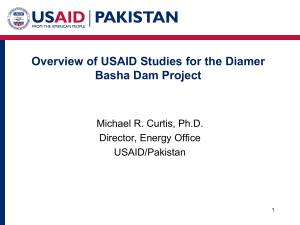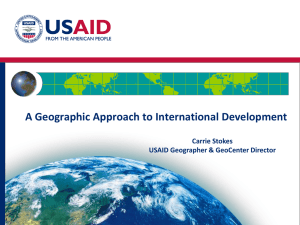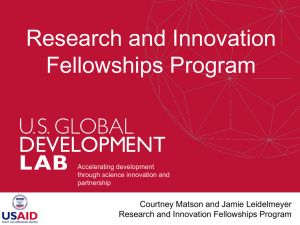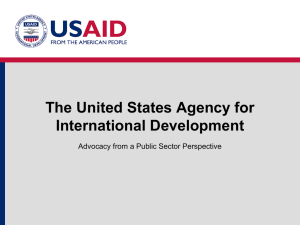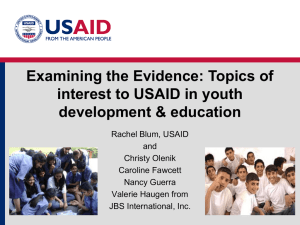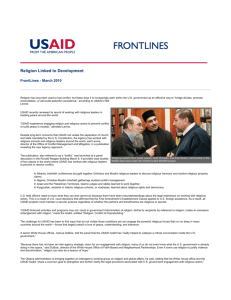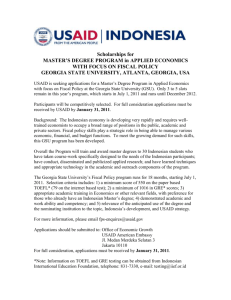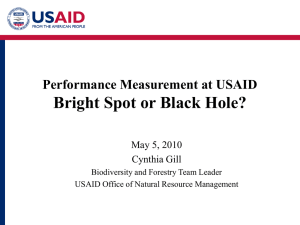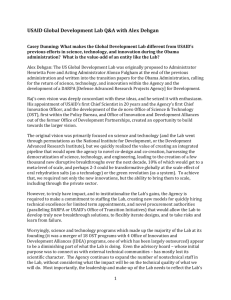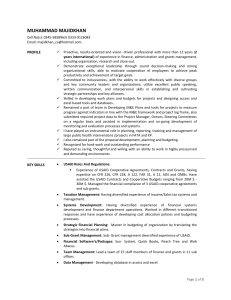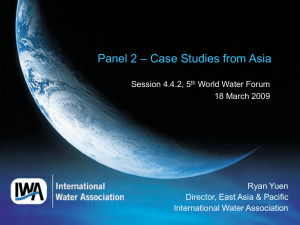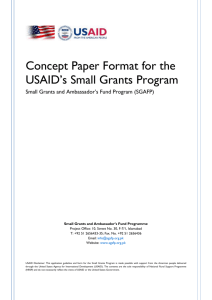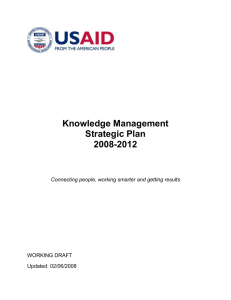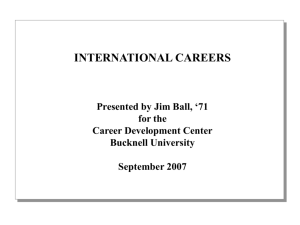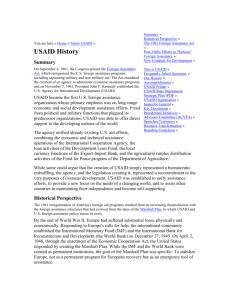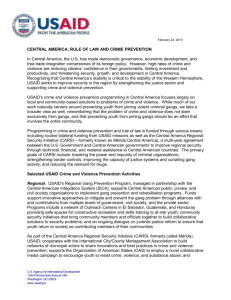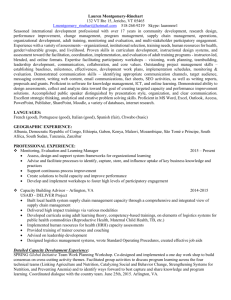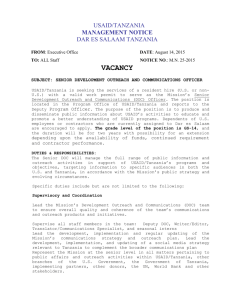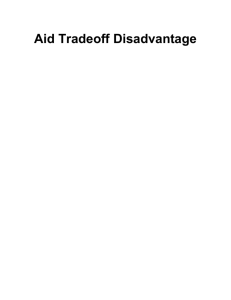neuroscience intervention
advertisement
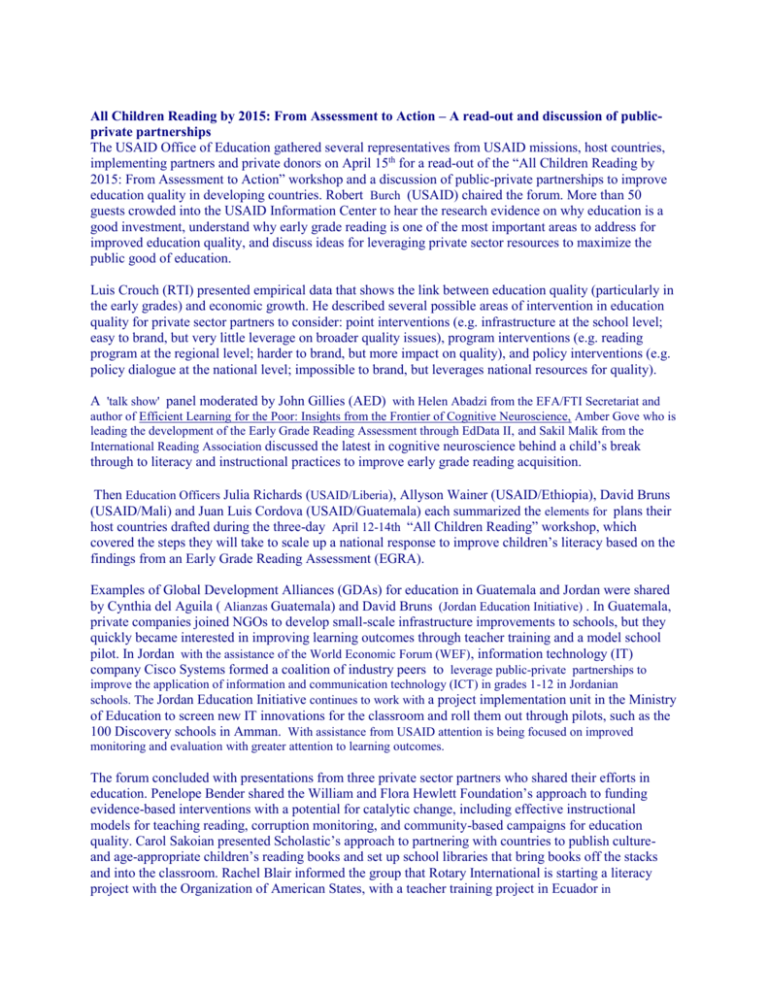
All Children Reading by 2015: From Assessment to Action – A read-out and discussion of publicprivate partnerships The USAID Office of Education gathered several representatives from USAID missions, host countries, implementing partners and private donors on April 15th for a read-out of the “All Children Reading by 2015: From Assessment to Action” workshop and a discussion of public-private partnerships to improve education quality in developing countries. Robert Burch (USAID) chaired the forum. More than 50 guests crowded into the USAID Information Center to hear the research evidence on why education is a good investment, understand why early grade reading is one of the most important areas to address for improved education quality, and discuss ideas for leveraging private sector resources to maximize the public good of education. Luis Crouch (RTI) presented empirical data that shows the link between education quality (particularly in the early grades) and economic growth. He described several possible areas of intervention in education quality for private sector partners to consider: point interventions (e.g. infrastructure at the school level; easy to brand, but very little leverage on broader quality issues), program interventions (e.g. reading program at the regional level; harder to brand, but more impact on quality), and policy interventions (e.g. policy dialogue at the national level; impossible to brand, but leverages national resources for quality). A 'talk show' panel moderated by John Gillies (AED) with Helen Abadzi from the EFA/FTI Secretariat and author of Efficient Learning for the Poor: Insights from the Frontier of Cognitive Neuroscience, Amber Gove who is leading the development of the Early Grade Reading Assessment through EdData II, and Sakil Malik from the International Reading Association discussed the latest in cognitive neuroscience behind a child’s break through to literacy and instructional practices to improve early grade reading acquisition. Then Education Officers Julia Richards (USAID/Liberia), Allyson Wainer (USAID/Ethiopia), David Bruns (USAID/Mali) and Juan Luis Cordova (USAID/Guatemala) each summarized the elements for plans their host countries drafted during the three-day April 12-14th “All Children Reading” workshop, which covered the steps they will take to scale up a national response to improve children’s literacy based on the findings from an Early Grade Reading Assessment (EGRA). Examples of Global Development Alliances (GDAs) for education in Guatemala and Jordan were shared by Cynthia del Aguila ( Alianzas Guatemala) and David Bruns (Jordan Education Initiative) . In Guatemala, private companies joined NGOs to develop small-scale infrastructure improvements to schools, but they quickly became interested in improving learning outcomes through teacher training and a model school pilot. In Jordan with the assistance of the World Economic Forum (WEF), information technology (IT) company Cisco Systems formed a coalition of industry peers to leverage public-private partnerships to improve the application of information and communication technology (ICT) in grades 1-12 in Jordanian schools. The Jordan Education Initiative continues to work with a project implementation unit in the Ministry of Education to screen new IT innovations for the classroom and roll them out through pilots, such as the 100 Discovery schools in Amman. With assistance from USAID attention is being focused on improved monitoring and evaluation with greater attention to learning outcomes. The forum concluded with presentations from three private sector partners who shared their efforts in education. Penelope Bender shared the William and Flora Hewlett Foundation’s approach to funding evidence-based interventions with a potential for catalytic change, including effective instructional models for teaching reading, corruption monitoring, and community-based campaigns for education quality. Carol Sakoian presented Scholastic’s approach to partnering with countries to publish cultureand age-appropriate children’s reading books and set up school libraries that bring books off the stacks and into the classroom. Rachel Blair informed the group that Rotary International is starting a literacy project with the Organization of American States, with a teacher training project in Ecuador in partnership with International Reading Association. Rotary International is also opening a new grantmaking process called “future vision” that will seek strategic partners in the education sector to help them target grants to evidenced-based interventions. A lively discussion at the forum presented several ideas for ongoing dialogue: · Private sector resources are so agile and results-driven that it is a shame they often get applied to “nice” education projects that lack any evidence of effectiveness. In the area of early grade reading, experts in the subject need to brought to the table when education quality interventions are being planned. · A primary obstacle to improving early grade reading in developing countries in a lack of books in school, at home, in mother tongues. Yet many international publishing contracts with governments are not negotiated with clear guidelines for producing books that target these needs (for instance, they often simply translate books from the official language into mother tongues, with a totally different outcome in terms of reading difficulty). USAID host country governments could benefit from a dialogue with publishing companies on best practices in publishing children’s books (including contract templates). · Intra-public partnerships are possible, such as a Ministry of Education working with the Ministry of Electricity in Bangladesh to coordinate power outages so that children would have light to be able to read and do their homework in the evenings before bed. These types of inter-ministerial (cross-sectoral) discussions focused on improving learning outcomes should be happening more frequently in developing countries, and USAID can play a role in facilitating this. · Finally, with the initial groundwork laid for a conversation on GDAs in education through this initial forum, further conversations between the private sector and USAID could focus on sharing specific partnership proposals and mapping out strategic agreements between the private sector and education teams in a particular country. This could begin with a face-to-face meeting and continue through a virtual “match-making” of investors and implementers in an online community.


